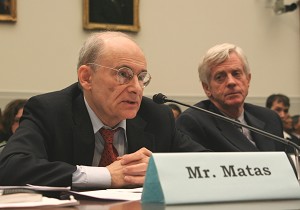Epoch Times: Organ Harvesting and the Chinese Communist Party -- What Is Our Responsibility?
Epoch Times Melbourne, Australia Staff
Nov 27, 2006
 |
| Canadian human rights lawyer David Matas (L) and the Hon. David Kilgour, former Canadian Secretary of State for Asia-Pacific, testify before the Congressional Subcommittee of Oversight and Investigations in Washington, D.C. (Lisa Fan/The Epoch Times) |
The recent acknowledgment by China's Deputy Minister of Health, Huang Jiefu, that the country has an organ harvesting "problem" has provoked differing reactions among the international community. Apologists for the Chinese Communist regime are touting it as a genuine attempt to clean up their act, while the skeptics see it as a smokescreen to deflect criticism away from China's deteriorating human rights situation in the run-up to the Beijing Olympics. But there may be more at stake for the Chinese Communist Party (CCP) than just the Olympics.
In a speech to a surgeons' conference at Guangzhou on November 15, Mr Huang admitted that there is a burgeoning trade aimed at performing transplants for foreign visitors at high prices, but placed the blame securely on the shoulders of a few rogue surgeons, thus attempting to divest the government of any responsibility.
There may be some justification for those claims of individual profiteering, as at least one Australian who went to China for a kidney transplant was instructed to pay the fee not to the hospital but into the surgeon's personal bank account.
On the other hand, a great many transplants take place in military hospitals, which means there has to be some involvement of the Communist Party establishment. Since military hospitals are outside the jurisdiction of the Ministry of Health, this is most likely a feeble attempt by the Party to plead non-involvement in this scandal. Not very convincing when everyone knows that the Party and the military are effectively one and the same.
A major concern regarding the potential effectiveness of the new regulations introduced last July, allegedly banning the sale of human organs, was that the new law would not apply to those military hospitals. The CCP announced the new law in March immediately following revelations by a former Chinese journalist and the wife of a Chinese surgeon that organs were being extracted from living prisoners of conscience, most especially Falun Gong practitioners, who had been placed in detention without any legal process.
Reports suggest that, as is often the case in China, with attempts to regulate unacceptable activities in any sphere, not much has changed in the months since the new law came into effect. A doctor by the name of 'Wang' from Tongren Hospital in Beijing admitted to Tribune Newspapers that the hospital used to have numerous advertisements in its publicity material about the organ trade, but had "cleaned them up" when the new rules came in. Of course the million dollar question is whether the organ trade itself has been cleaned up or only the advertisements.
Many recent articles have focused on the harvesting of organs from executed criminals and the evidence from the likes of dissident Zhang Jianhua, a former officer at the Shenzhen Public Security Bureau in Guangzhou Province, suggests that the necessary donation permission is rarely obtained. In fact executions are generally timed to coincide with the arrival of a wealthy patient requiring an organ--all the necessary blood tests etc having been performed as soon as the prisoner was incarcerated.
The practice of using death row prisoners as an organ bank is abhorrent enough, particularly when one considers that people are executed in China for what we would consider quite trivial crimes, and often purely on the strength of confessions extracted by torture. However, the findings of a report by former Canadian Secretary of State David Kilgour and international human rights lawyer David Matas into the organ harvesting from live Falun Gong practitioners has exposed a crime that is in an entirely different league.
The aforementioned report documents a huge increase in transplant activity in China following the incarceration of hundreds of thousands of Falun Gong practitioners since July 1999. Most disturbingly their research could not find legitimate donors for around 41,500 organ transplants performed in the years since the persecution of Falun Gong began.
It may well be that the Chinese Communist Party is anxious to improve its image prior to the Olympics and has surmised that blanket denial of organ harvesting would seriously undermine the state's credibility. However, it is also likely that the CCP is even more anxious to prevent any serious international investigation into the scandal of organ harvesting, most particularly the removal of organs from living Falun Gong practitioners who were completely innocent of any crime and should never have been incarcerated in the first place.
Should such atrocities be proven, and should it also be proven that the Chinese Communist Party has sanctioned those activities, then a removal of the Olympics to a new location is the very least punishment that could be imposed. Anyone with a shred of humanity would surely also demand that a China ruled by the CCP should be judged unworthy of any seat, let alone a permanent one, on the United Nations Security Council and that punitive economic sanctions should be immediately imposed.
The simple fact is that China needs raw materials and investment much more than the west needs an unlimited supply of shoddy consumer goods. Such forthright action from the west might just encourage tens of millions more to join the 15 and a half million Chinese who have already denounced and quit the CCP, thus paving the way for a free and democratic China in which international standards of human rights would be respected.
http://theepochtimes.com/news/6-11-27/48550.html